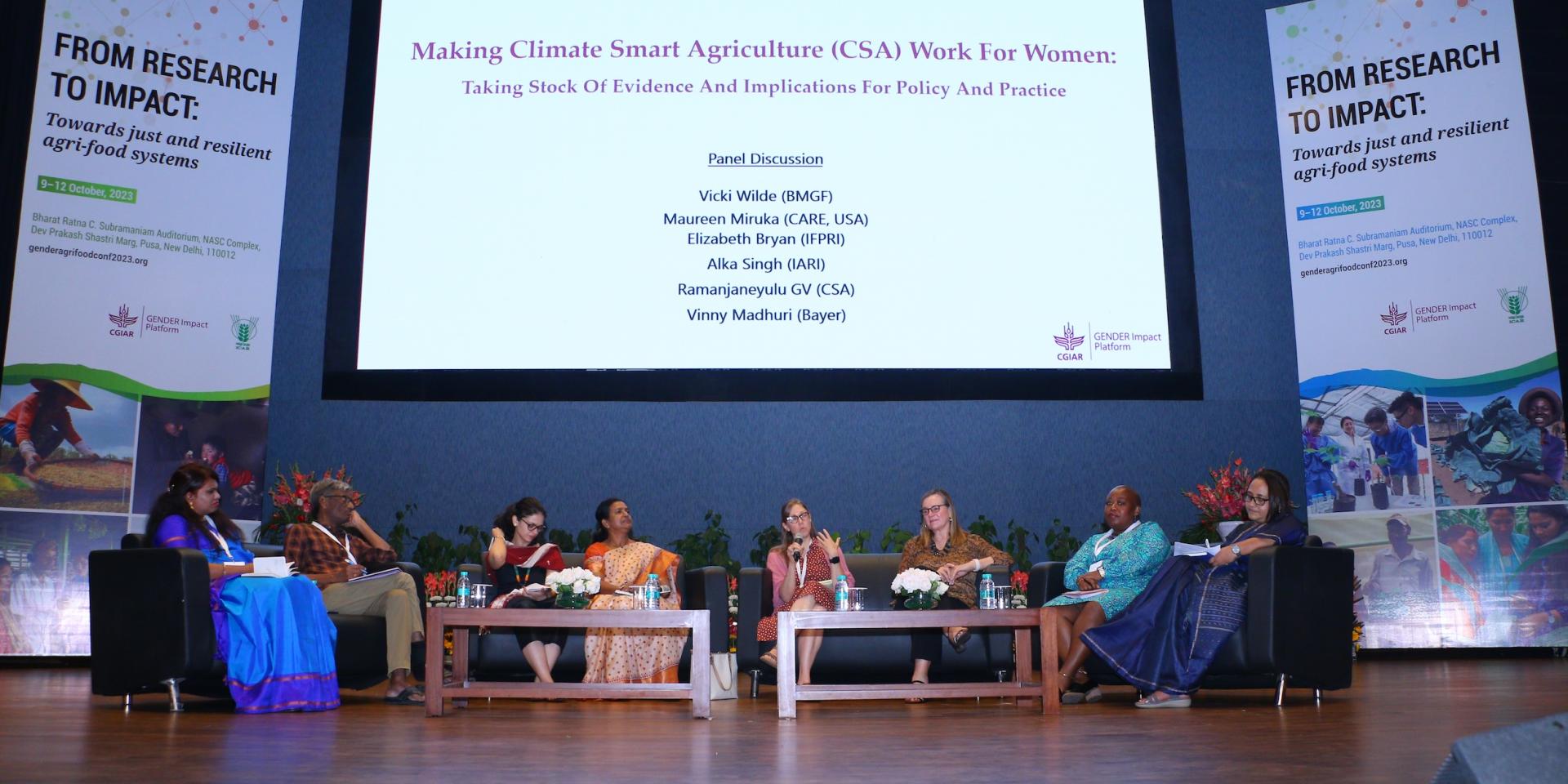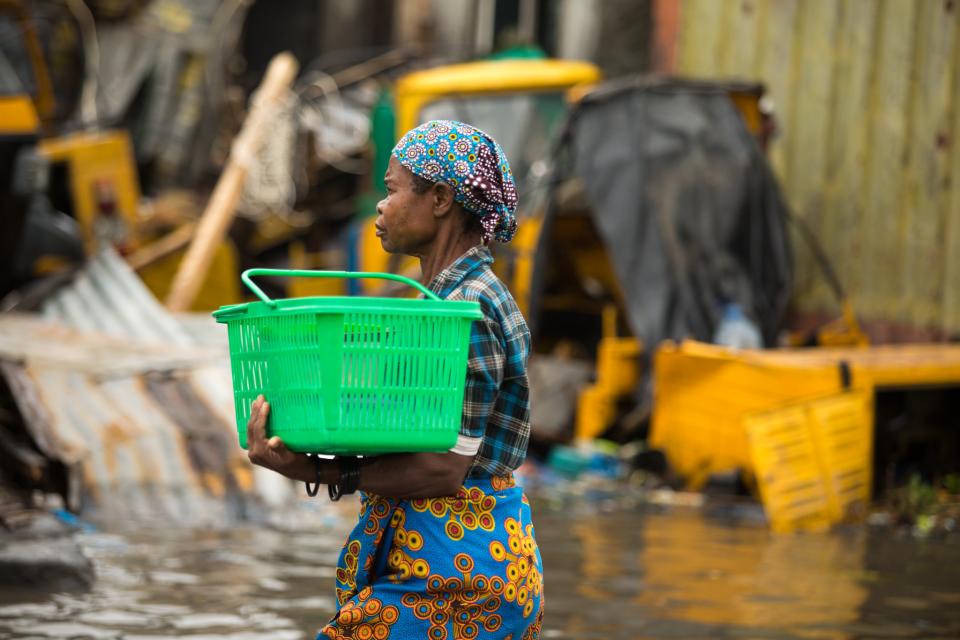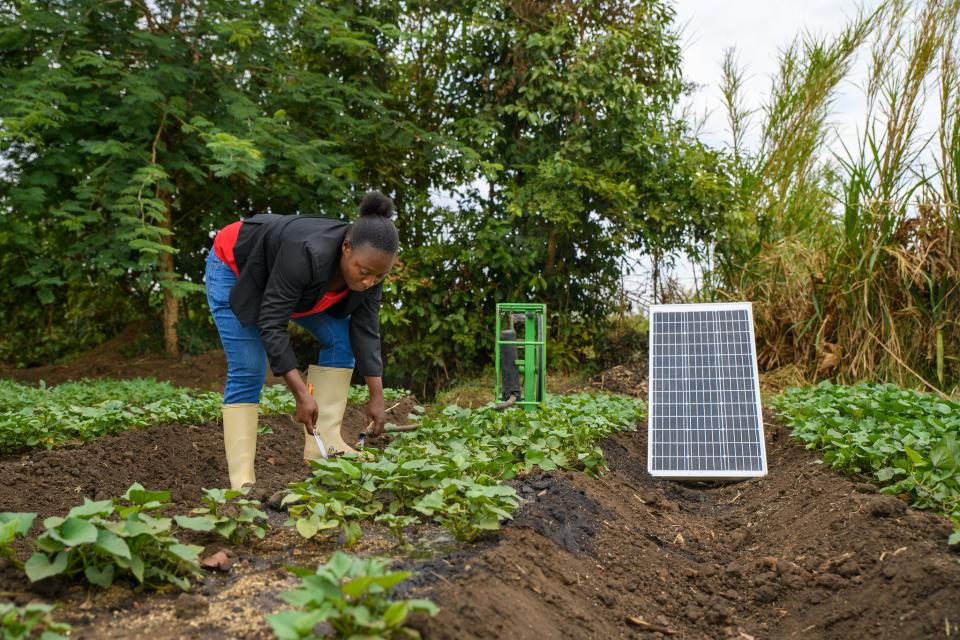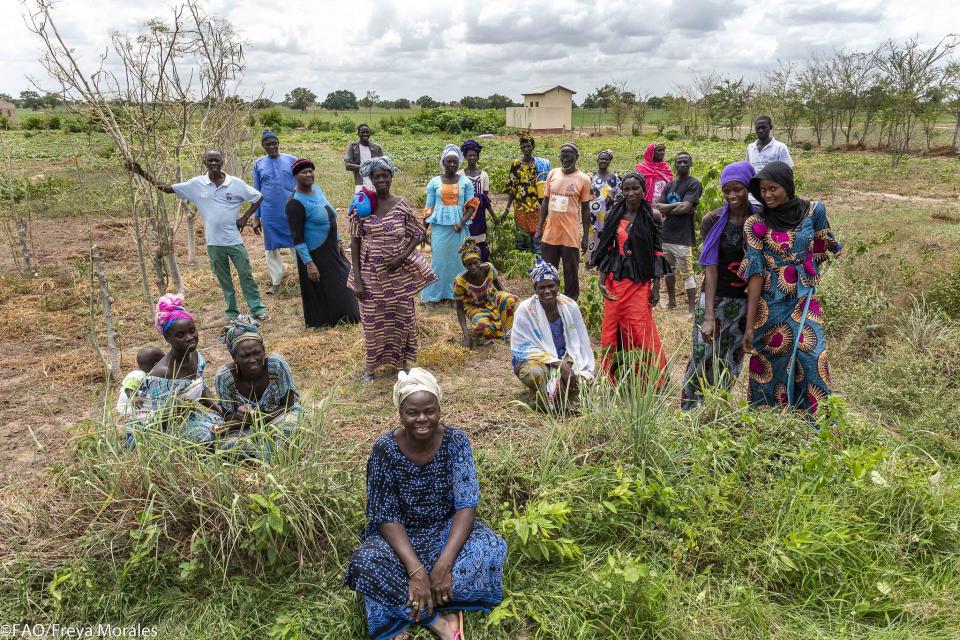Making climate-smart agriculture work for women: what will it take?
 Photo: GreyMatters Communications.
Photo: GreyMatters Communications.
Women are more vulnerable to climate change impacts than men, and they have varying abilities to cope and adapt to climate change. The uptake and outcomes of climate-smart agriculture (CSA), which has emerged as an integral approach to tackle the emerging climate-related challenges in agriculture, is affected by gendered differences in agri-food systems. In a recent discussion, gender researchers and experts grappled with how more women can benefit from the promises of CSA.
During the 2023 CGIAR gender research conference in New Delhi, India, the Evidence Module of the CGIAR GENDER Impact Platform organized a panel discussion on CSA and gender. In tune with the conference title, ‘‘From research to impact: Towards just and resilient agri-food systems”, the panel’s objective was to take stock of the current evidence and map a way forward for making CSA work for women through policy and practice.
Dr. Ranjitha Puskur, Leader of the Evidence Module and moderator of the panel discussion, introduced the objectives and panelists. Dr. Aayushi Malhotra, Assistant Scientist in the Evidence Module, presented a brief synthesis of the evidence generated by the Platform through a range of research studies, including evidence gap maps, systematic and scoping reviews and hotspot mapping studies.
The presentation highlighted the relevance of hotspot mapping in identifying geographical areas where women are most vulnerable, the variable roles of gender norms in CSA adoption, regional imbalances in CSA interventions and lack of impact evaluations, the negligible availability of climate finance to drive a gender-responsive CSA agenda, the untapped potential of the private sector and challenges concerning the dearth of gender-disaggregated data and mitigation efforts carried out through CSA.
The evidence presented resonated with the individual experiences of the panelists who represented various stakeholders, including donors, research organizations, private sector and development practitioners. They used their diverse expertise to further unpack the evidence and its implications for policy and practice, and they offered their views on what is needed to make CSA work for women:

Panelists in discussion during the 2023 CGIAR GENDER-ICAR conference. Photo: CGIAR GENDER Impact Platform.
Leverage climate finance for inclusivity and redefine priorities in the private sector
Ms. Vicki Wilde, Senior Program Officer at the Bill & Melinda Gates Foundation’s Agricultural Development team, focused on the evidence on climate finance to highlight the paucity of funds diverted toward agriculture along with the lack of adequate gender tagging. Wilde added that there is an urgent need to discover and create more pathways to divert climate finance for innovation in agriculture that could foster gender inclusivity and women’s leadership. She also stressed the importance of emerging approaches like agroecology, nature-based solutions and integrating local agricultural knowledge with CSA practices to help promote diversification, adaptation and pave a way for desirable transformation in agri-food systems.
On the role of the private sector in advancing CSA, Ms. Vinny Madhuri Gandham, an agri-business expert and current lead of the Rice Crop Division for India, Bangladesh and Sri Lanka at Bayer Crop Science, underscored that companies like Bayer play an important part in making CSA solutions cost-effective and accessible to smallholder farmers, especially women. Through their own research programs, and as an extension of their corporate social responsibility activities, many private corporations are working toward gender equality goals; however, their efforts remain unsystematic and undocumented. Apart from systematically documenting the ongoing work and making it available in the public domain, in her opinion, it is time for private agri-companies to redefine their goals and pronounce gender responsiveness as an integral component for a better social impact and increased reach.
Target local contexts, farmers collectives and tackle institutional barriers
Reflecting on how to make CSA work for women at the local level, Dr. Elizabeth Bryan, Co-lead of Methods Module of the CGIAR GENDER Impact Platform, highlighted the growing uncertainty that governs the agricultural development discourse in the times of climate change. Based on her experience, Bryan proposed that research needs to include the angle of uncertainty into designing forward-moving, needs-based solutions that are sensitive to the local gendered contexts. Enlisting some of the effective strategies for successful CSA interventions, she mentioned that targeting groups and collectives and experimenting with digital solutions such as video-based behavioral change interventions are seemingly more successful in not just introducing CSA practices, but also influencing their uptake.
While talking about CSA at the grassroots level, Dr. Ramanjaneyulu GV, Executive Director at the Centre for Sustainable Agriculture and Expert Director at Sahaja Aharam Producer Company, stressed the importance of collaborative approaches. According to him, it remains an uphill task for women farmers at an individual level to access some of the basic requirements that could help them adapt and cope with the emerging challenges. To make them ‘climate ready’ and able to adopt more of the climate-smart practices, he suggested to break the institutional barriers to access finance, introduce innovative subsidies through ecosystem services and social goods, and promote blended approaches. Ramanjaneyulu also noted the merit of stimulation programs that facilitate an initial nudge to adopt new practices as a crucial part of successful CSA interventions.
Update policies, educate officials and gather data
Dr. Alka Singh, who heads the Division of Agricultural Economics at the Indian Agricultural Research Institute of the Indian Council of Agricultural Research, shed light on how the presented evidence aligns with government policies and initiatives related to agriculture and climate change in India. She mentioned that after a long period of neglect, there has been a shift in governmental outlook toward the gender component in devising policies and programs related to CSA and agriculture in general. In her opinion, promoting interdisciplinary education in agricultural universities and creating spaces for dialogues around gender issues will be crucial for sensitizing government officials as well as students to redirect the course of innovations, policies and practices.
In the opinion of Dr. Maureen Miruka, who is a Gender Specialist and Senior Director of Program Quality and Partnerships at CARE USA, the unavailability of gender-disaggregated data is one of the major root causes for not achieving the desirable outcomes and impact through CSA. Highlighting the significance of ‘data for change’, she underlined the need for effective frameworks to capture the relevant data for monitoring and evaluation and for having an effective ‘translation process’ in place that can make the data usable for policy reforms.
A lot remains to be done; collaboration a crucial first step
All the panelists, based on their diverse experience and understandings, made a few common significant observations that emphasized considering gender dimensions at all stages of CSA activities, including design, implementation, monitoring and evaluation. They agreed the key focus should remain on redirecting efforts toward fostering collaboration among stakeholders, breaking knowledge silos by promoting inter- and trans-disciplinarity, and on cultivating synergies among partners. These measures are crucial for gender-responsive transformation of agri-food systems through CSA.
The panel discussion at the 2023 conference served as a moment to reflect and assess the gaps in CSA-related policy and practice. As the CGIAR GENDER Impact Platform and partners continue evidence generation and synthesis, the insights gained through this discussion will guide the development of evidence-based CSA strategies, steering the course toward more gender-inclusive and resilient agri-food systems.
Reflecting on the evidence and experiences brought forward in this session, the issues that need urgent and substantive attention are: adapting CSA technologies and practices to be gender responsive; scaling adoption by women; gathering robust data and evidence (including impact evaluations) to inform policy and practice; effectively targeting women; ensuring adequate finance; promoting collective action and bridging the digital gender divide; encouraging interdisciplinary research for development; fostering multi-stakeholder collaboration, including a stronger engagement of the private sector; and fostering an enabling policy environment.
Referencing the adage “the last mile is always the most difficult”, Dr. Puskur summarized the discussion by concluding that there is still a lot to be done to make CSA work for women.


